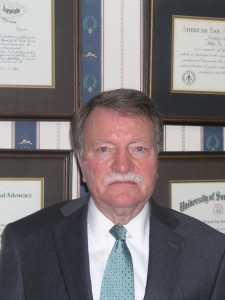
John K. Koon
Koon & Cook PA 2016 Gadsden Street Columbia, SC 29201 Practice Area(s): Personal Injury, Medical Malpractice call (803) 256-4082 fax (803) 254-0658 email info@koonandcook.com visit website
Biographical Information
John K. Koon is a resident of Lexington County, and has practiced law in South Carolina since 1974. He was born in Newberry County and has been married to Darnell B. Koon for 50 years together they have two children and six grandchildren. Mr. Koon received his undergraduate degree from the University of South Carolina and he graduated from the University of South Carolina School of Law in 1974.
Admission Dates & Jurisdictions
All South Carolina State Courts
United States District Court for the District of South Carolina
United States Court of Appeals for the Fourth Circuit (Richmond, Virginia)-January 19, 1976
The U. S. Supreme Court – December 12, 1977
Education
American Association of Justice (formerly American Trial Lawyers Association)
South Carolina Association of Justice (formerly South Carolina Trial Lawyers Association
South Carolina Bar
Education: University of South Carolina School of Law, J.D., 1974
University of South Carolina, B.S. in Business, 1971
Mid Carolina High School, Prosperity, SC, 1961
Professional Experience
Koon & Cook, P.A. 1991-present
John K. Koon, P.A. 1979-1991
Dallas D. Ball, P.A. 1974-1979
Honors & Awards
2010 rated AV Preeminent for 10 years by Martindale-Hubbell.
2011 rated AV Preeminent Lexis Nexis
2012 Top Attorneys in South Carolina by Columbia Living Magazine.
Representative Cases
Baggerly vs. CSXT and Amtrak – Abrogated the South Carolina statute prohibiting testimony of an out of state engineer without first obtaining a South Carolina license.
Elam v. Elam – Parental immunity common-law doctrine applicable to tort actions brought by an unemancipated minor against the parents was abolished.
Stokes v. First National Bank – The first South Carolina case recognizing a mental on mental Worker’s Compensation claim without a physical injury.
Risinger v. Risinger – Family court could require divorced husband to contribute money necessary to enable a child, who is over the age of 18, to attend college.
Beall v. Beall – First time South Carolina courts allowed nonmutual offensive collateral estoppel (issue preclusion).
